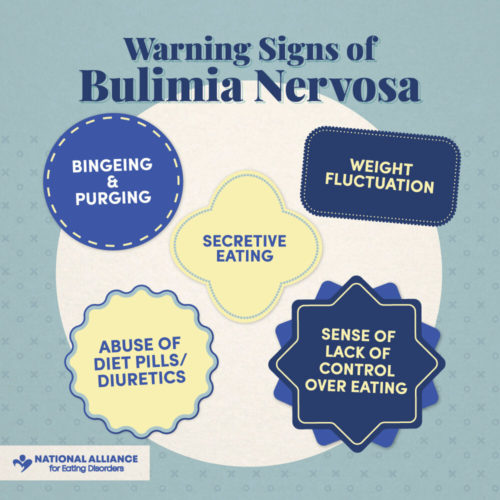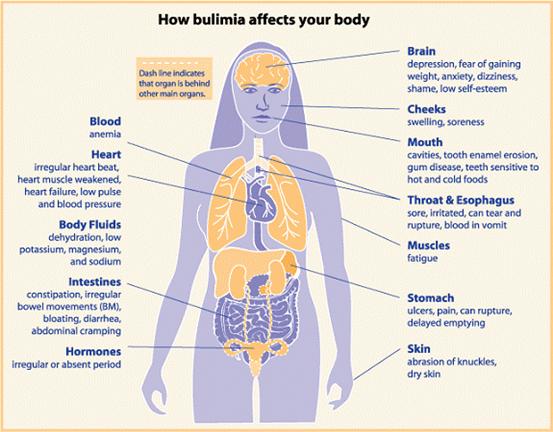Summary:
Bulimia Nervosa is an eating disorder that involves binge eating and purging. Those who struggle with bulimia go on binges where they eat uncontrolled, large amounts of food, and then later on they force themselves to throw up. Purging is extremely unhealthy, and people who have bulimia typically do it to try and lose the calories that they just consumed. Another way people force themselves to lose the calories in unhealthy ways can even include using mass laxatives, enemas, and weight loss supplements. It’s common for people to be hyperfixated on their body image and that is most likely why they try to get rid of the calories they consumed in unhealthy ways, because they feel guilty for everything they just ate.
Description:
Some symptoms of bulimia nervosa are living in fear of gaining weight, always worrying about your body weight, losing control over how much you eat/going on binges, and fasting between binges. There are a lot of different warning signs and different methods that people with this eating disorder use. It is definitely recommended if you experience any of these symptoms to see a doctor. Severity of the disorder is normally determined by how many times a week you purge.

Bulimia is extremely based around compulsive thoughts. The overthinking about body image, having times where people consume nothing, but then hours later binging uncontrollably, just to try and get rid of it right after because you regret it. Bulimia is also considered a mental disorder because of how much obsessing people with this disorder struggle with and how most of it is mind games for them. Bulimia can be found in anyone no matter the gender, and it can also be genetic in some cases. Another thing to note about people with bulimia is that oftentimes, people who struggle with this have perfectly normal body weights/shapes. They are not always ultra thin or overweight.
Bulimia can have extreme and lifelong side effects. Since all bodily functions depend on how much you eat and what vitamins are included in your intake (i.e. protein, fat, sugar, carbs, etc), people who struggle with bulimia and try to get rid of those vitamins and nutrients can have a lot of health problems. Some common ones are anemia, low blood pressure, dry skin, stomach ulcers, gastrointestinal problems, and even kidney failure. It is also common for women to struggle with irregular periods and issues within their reproduction system as an effect from bulimia. Especially with women who are pregnant and still actively struggling with bulimia, they can harm the baby and even have a stillbirth or miscarriage. That is why it is extremely important to seek help if you struggle with bulimia no matter who you are.

News Articles about Bulimia:
The first news article that caught my eye about Bulimia was this one from NBC that highlights how eating disorders are being more commonly found in adolescents recently, and it was published in April this year (2023) : https://www.nbcnews.com/health/health-news/eating-disorders-anorexia-bulimia-are-severe-ever-rcna80745
To summarize this article, news reporter Caroline Hopkins writes about how teen eating disorders are on the rise and have became more serious including many many cases that have led to hospitalization. She explains how it has been on an uprise since the pandemic and how the quarantine may have caused kids to develop these disorders while they were not able to participate in their normal everyday activities like sports, clubs, going to school, working out, etc. Experts say that eating disorder-related health visits like therapy, pediatrician appointments, and hospital stays have doubled among teenagers under the age of 17 in the past five years.
The other article I was pretty interested in was also by NBC except it was published in 2021, two years prior to the other one I just wrote about. This was when a lot of quarantines were still happening too, because COVID was still pretty serious all throughout 2021. https://www.nbcnews.com/health/health-news/pandemic-created-perfect-storm-eating-disorders-teens-n1268331
This article went into a much further description about how rapidly and severely eating disorders were becoming at the beginning of the pandemic. A doctor noted that there was a 53% increase to the helpline for eating disorders across the United States since the beginning of the pandemic. A third of those patients were ages 13-17, and 36% were 18-24 years old. It was also highlighted in the article specifically how isolation and more alone time effected teens because they are so used to having their lives based around socializing, and when that was taken away, they had to turn to other things. Students didn’t have their sports teams, drama club, extracurriculars to attend to anymore. Another health professional mentioned that the pandemic ‘threw kids for a loop’.
References:
Cherney, K. (2018, August 15). 10 facts about bulimia. Healthline. https://www.healthline.com/health/bulimia-facts#10.-Its-a-lifelong-battle.
Cleveland Clinic. (2022, May 16). Bulimia Nervosa: Signs & Symptoms, Complications & Treatment. Cleveland Clinic. https://my.clevelandclinic.org/health/diseases/9795-bulimia-nervosa
Mayo Clinic. (2018, May 10). Bulimia Nervosa – Symptoms and Causes. Mayo Clinic; Mayo Clinic. https://www.mayoclinic.org/diseases-conditions/bulimia/symptoms-causes/syc-20353615